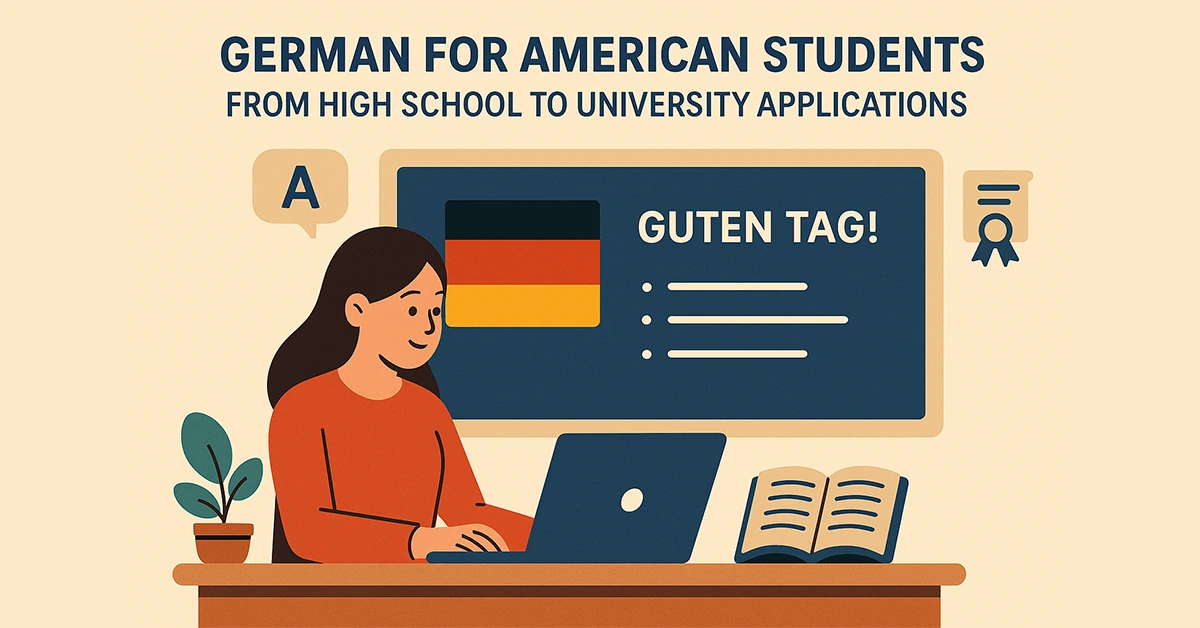German for American Students – From High School to College

German for American Students is an increasingly important topic for young learners aiming to stand out in their academic and professional careers. From fulfilling high school requirements to enhancing college applications, learning German offers long-term advantages in today’s globalized world.
Why American Students Should Learn German
German for American Students is becoming more relevant than ever. As the most widely spoken native language in Europe and a key language in science, engineering, and international business, German opens doors to global opportunities. Learning it can enhance cultural understanding and provide a competitive edge in college applications.
Benefits of Learning German in High School
Studying German in high school allows students to gain early exposure to a foreign language, making it easier to reach fluency. It can also fulfill foreign language requirements for graduation and college entry.
- Improves cognitive skills and memory
- Boosts SAT verbal scores
- Enriches cultural appreciation
How to Start Learning German as a Beginner (Free Tools & Strategies)
There are many free resources tailored to German for American Students, including:
- Duolingo and Memrise for vocabulary practice
- BBC Languages for beginner lessons
- YouTube channels like Learn German with Anja
German: Ich lerne Deutsch mit Duolingo. [ɪç ˈlɛʁnə dɔʏtʃ mɪt ˈduːoˌlɪŋgo]
English: I am learning German with Duolingo.
Best German Language Programs for American High School Students
Some of the top high school programs offering German include:
| Program | Details |
|---|---|
| STARTALK | Summer immersion programs funded by the U.S. government |
| Goethe-Institut PASCH | Support for German instruction in U.S. schools |
| Concordia Language Villages | Residential language camps with German immersion |
German for AP and IB Students – What You Need to Know
AP and IB German programs offer college-level curriculum and exams in high school. AP students focus on communication and culture, while IB emphasizes global context and in-depth skills.
German: Ich bereite mich auf die AP-Prüfung vor. [ɪç bəˈʁaɪ̯tə mɪç aʊ̯f diː ˈʔaːpeː ˈpʁyːfʊŋ fɔʁ]
English: I am preparing for the AP exam.
Essential German Vocabulary and Grammar Topics for High School Students
Important topics include:
- Regular and irregular verbs (essen, gehen, haben)
- Word order in main and subordinate clauses
- Common nouns and adjectives (schön, groß, wichtig)
German: Ich habe einen Hund. [ɪç ˈhaːbə ˈʔaɪ̯nən hʊnt]
English: I have a dog.
How to Practice German Speaking and Listening as a US Student
Use language exchange apps like Tandem, watch German TV shows with subtitles, and join virtual German clubs or Discord communities.
German: Ich spreche mit einem Freund aus Deutschland. [ɪç ˈʃpʁɛçə mɪt ˈʔaɪ̯nəm fʁɔɪ̯nt aʊ̯s ˈdɔʏtʃlant]
English: I speak with a friend from Germany.
Setting Realistic Goals for Learning German in School
Goals help track progress. For example:
- Learn 20 new words each week
- Watch one episode of a German show weekly
- Take a language certification exam within a year
How German Helps with College and University Applications
German for American Students is a strong asset on applications. It shows dedication, global awareness, and academic ambition—qualities colleges value.
Which German Exams Should You Take? (Goethe, TestDaF, DSD)
Options include:
- Goethe-Zertifikat: Recognized worldwide for different CEFR levels
- TestDaF: Required for admission to German universities
- DSD (Deutsches Sprachdiplom): School-based with strong recognition
Studying in Germany – Language Requirements for US Students
Most universities require B2 level German for full-time study. Foundation or Studienkolleg programs are available with lower levels.
German: Ich möchte in Deutschland studieren. [ɪç ˈmœçtə ɪn ˈdɔʏtʃlant ʃtuˈdiːʁən]
English: I want to study in Germany.
Scholarships and Exchange Programs for US Students Learning German
- Congress-Bundestag Youth Exchange (CBYX)
- DAAD Scholarships for undergrads
- High school exchange through AFS, YFU, or Rotary
Success Stories: American Students Who Studied German and Excelled
Many U.S. students have built careers in international relations, engineering, or academia thanks to their German skills.
Example: Jane, a student from Illinois, earned a scholarship to study in Berlin and now works for a tech firm in Munich.
Conclusion: Why Now Is the Best Time to Learn German as a Student
With so many free tools, school programs, and international opportunities, there’s no better time to start learning German. German for American Students is more than a language—it’s a gateway to a global future.
FAQ – Learning German as an American Student
Is German hard to learn for English speakers?
No. German and English share many roots, especially in vocabulary.
Can I learn German without traveling to Germany?
Yes. Online courses, apps, and virtual tutors make it possible.
How long does it take to reach B1 level?
With regular study, students can reach B1 in 6–9 months.
Is learning German useful for science or business?
Absolutely. German is a key language in science, engineering, and international trade.